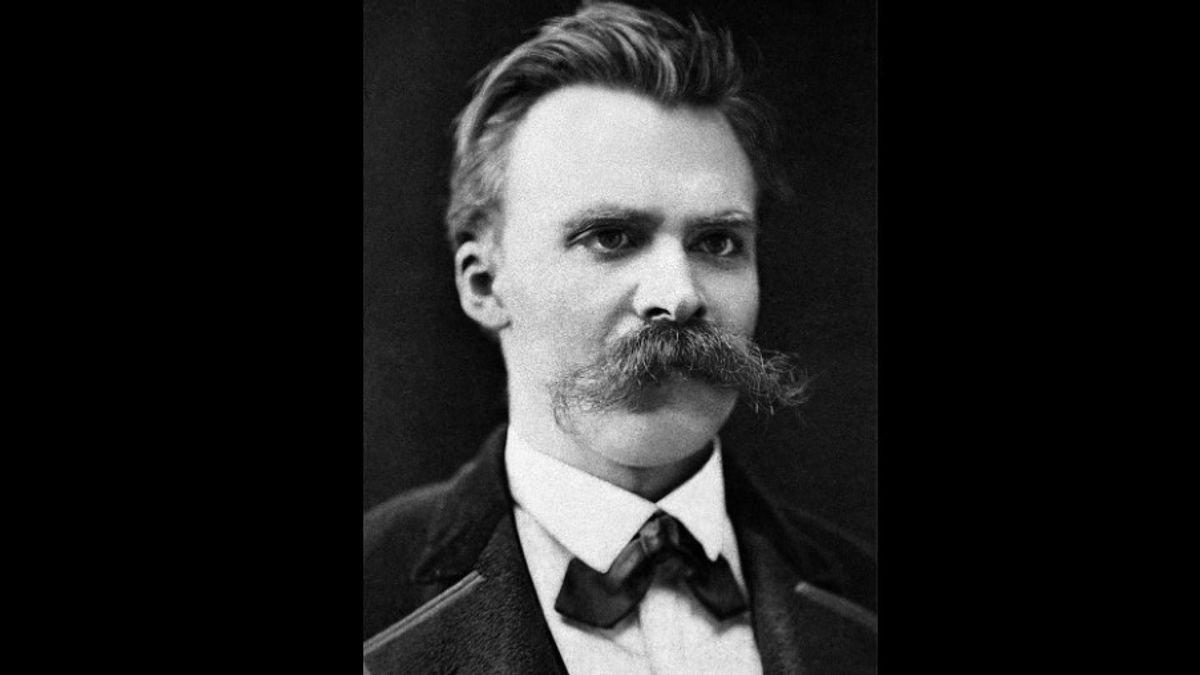JAKARTA - "God is dead. God is still dead. And we have killed him." It is the most famous quote from the legendary philosopher Friedrich Nietzsche. But that expression cannot be swallowed raw. There is a social critique inherent in the idea that is often associated with the birth of nihilism.
Nietzsche was born on this day October 15 mid 19th century or in 1844. He grew up in a religious family.
Her grandfather was a writer of books defending Protestantism and had an important position in the church. Meanwhile, his father, Carl Ludwig Nietzsche, as quoted by Britannica, was appointed a priest in Röcken on the orders of King Friedrich Wilhelm IV of Prussia.
Nietzsche's father died in 1849, before Nietzsche's fifth birthday. He spent most of his childhood in a family of five women: his mother, Franziska, his younger sister, Elisabeth, his maternal grandmother, and two aunts.
Apart from family, Nietzsche's educational background is also full of religious values. He was accepted at Schulpforta, Germany's leading Protestant boarding school. He excelled academically and received an outstanding classical education there.
After graduating in 1864, he went to the University of Bonn to study classical theology and philology. Despite attempts to take part in the social life of the university, two semesters in Bonn failed, mainly due to heated arguments between two of the leading classical professors, Otto Jahn and Friedrich Wilhelm Ritschl.
In 1865 he transferred to the University of Leipzig, joining Ritschl, who had accepted an appointment there. It was in Leipzig that Nietzsche changed the course of his life.
He invented Arthur Schopenhauer's work Die Welt als Wille und Vorstellung (The World as Will and Representation). These findings had a major influence on Nietzsche, namely from philology to philosophy. It was while studying philosophy that he later spawned a controversial expression. He said that God was dead.
Its true meaning
As extracted from Yulius Aris Widiantoro's writing entitled Nihilism as an Existential Problem (2009), Nietzsche's expression can be understood as a description of how he understands the world as a reality that needs to be lived without questioning good and bad as absolute moral standards. According to him, humans have long been in the grip of supernatural or divine powers which have unwittingly stripped away all of man's vital potential.
Humans need new nuances, namely nuances that are free from all kinds of values and nuances that are more accommodating to all the creativity of each individual. Since then, it seems that God is no longer accommodating and aspirational and is even considered frightening because he always observes human behavior, so that the space for human freedom is cornered and almost disappeared, even though it is the expression of freedom that indicates how noble human existence is.
Nietzsche is well aware that humans must escape from divine intervention and certain values lead to a stage or life without value, because life without value is an absolute prerequisite for realizing a meaningful life.
Nietszhe's thinking is often associated with the birth of nihilism thought. An understanding holds about how humans try to let go of dependence on anyone and anything except their own strength.
Nihilism also contributes to the feeling of skepticism about all cosmic / God orders that are irrelevant if they are attached to the times. This understanding considers that with God, human efforts to develop themselves become obstructed in the name of God and morality.
Nearly half of Nietzsche's life was spent as an academic. He became a professor at the University of Basel Switzerland and resigned in 1879 because of his failing health. Nietzsche died on August 25, 1900.
The English, Chinese, Japanese, Arabic, and French versions are automatically generated by the AI. So there may still be inaccuracies in translating, please always see Indonesian as our main language. (system supported by DigitalSiber.id)












